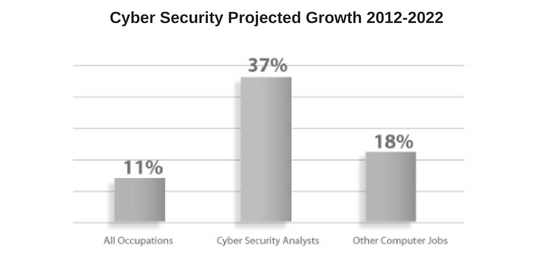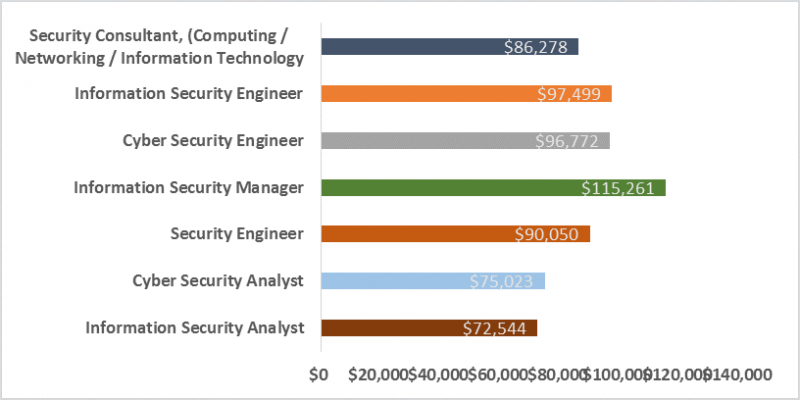The cyber security industry is flourishing. With data breaches affecting all sectors of industry, organizations are clamoring to hire IT security professionals.There’s a huge demand for cybersecurity, but a shortfall of qualified personnel. The New York Times has reported that the demand for cybersecurity jobs will increase manifold and result in 3.5 million unfilled positions by 2021.

For Whom the Cyber Security Career is the Best and Why?
Cybersecurity includes a lot of ground and a lot of different disciplines from basic tech support skills to auditing to IT to engineering to networking communication. You also require common presentation skills and the ability to talk to people at all levels of the corporate ladder. Successful cybersecurity professionals deal with many of these disciplines, not necessarily all of them. Again, there are a lot of places a person can go into the world of cybersecurity.
Why You Should Become Cybersecurity Professional
-
A Shortage of Cybersecurity Professionals
Cybersecurity professionals worldwide face an ever-evolving threat aspect that many feel they are ill-equipped to manage. Data breaches at corporations, government agencies, and educational institutions continue to erode public confidence in the case of cybersecurity. Global Information Security Workforce Study (GISWS) by 19,641 cybersecurity professionals representing 170 countries indicate that Two-thirds of there are not enough cybersecurity workers in their organizations to meet the challenges they currently face. This year’s Study reveals we are on pace to reach a cybersecurity workforce gap of 1.8 million by 2022, a 20% increase over the forecast made in 2015. It also reveals trends and insights into how hiring managers are responding and what organizations can do to attract, enable and retain the cybersecurity talent necessary to combat the risks in today’s ever-evolving threat environment.

-
Top Concerns Globally
The data shows much work is yet to be done to secure businesses, government agencies and organizations of all sizes, and the critical importance of having an adequately staffed, agile and reactive workforce. However, in the 2015 edition of the GISWS, 62% of information security workers stated having too few workers to address the threats they faced. In 2017, that number has ticked higher, with 66% indicating that they do not have the staff necessary to address the risks, suggesting that the shortage of information security professional is widening, as more sectors recognize the value of deploying a skilled cyber workforce to protect their data. -
Understanding the Skill Gap
In 2015, Frost & Sullivan determined a 1.5 million worker shortage by 2020. In data of recent events and shifting industry dynamics, that forecast has been revised to a 1.8 million worker shortage by 2022. This is reflected by the especially high number of cyber security professionals across the globe who show that there are not enough workers in their departments.
Workers cite a variety of reasons why there are too less information security workers, and these reasons vary regionally, however, globally the most common reason for the cyber security professional shortage is a lack of qualified personnel. Nowhere is this trend more general than in North America, where 68% of professionals believe there are too few cybersecurity workers in their department, and a majority considers that it is a result of a lack of qualified personnel.
-
Demand in Globally
Globally, the most sought-after positions are Operations & Security Management, with 62% of the workforce showing that there are too few who occupy this position, followed by Incident & Threat Management and Forensics, at 58% globally. In fact, the latter position is in higher demand in LATAM (63%) and the Middle East & Africa (65%) than any other position. Notwithstanding efforts by managers to increase hiring, historically demand has outpaced supply, and Frost & Sullivan projects that the gap will grow if current trends remain. Nearly 90% of the global workforce is male, a number that continues unchanged, and the majority arrive in information security with a computer science or engineering background. It is clear, as evidenced by the increasing number of professionals who feel that there are too few workers in their field, that traditional recruitment channels are not meeting the demand for cybersecurity workers around the world. -
Women in Cybersecurity
The information security workforce is dominated by men, and The GISWS Women in Cybersecurity describes in detail many of the barriers, including different forms of discrimination, faced by women in the field. Also, young workers are more likely to express lower levels of satisfaction than their older peers and are the most likely to move their job in favor of another. Addressing the underrepresentation of women in cybersecurity and increasing faith among young people are two essential ways companies can start to fill the 1.8 million worker gap projected for 2022.
-
Practically unlimited growth
With an ever-expanding scope, cybersecurity presents the ultimate growth potential—both in your career path and for learning opportunities. A good cybersecurity professional works to understand as much as possible about how technologies and organizations work. A great cybersecurity professional understands that the knowledge never stops. That's a huge opportunity to stay engaged and challenged. When security teams started out, they were built from "jack-of-all-trades" types. The discipline hadn't grown enough to support specialties in forensics or application security or incident response.
The current workload has forced security teams to scale up and out quickly. Opportunity is there for professionals ready to challenge themselves to take it.Whether you're looking to work your way towards a Chief Information Security Officer (CISO) role or to work with new technologies, the only thing that will limit your growth is your desire.

-
Lots of Variety
All of the opportunities for growth are tied to the type of technologies and situations security professionals have to deal with. Security professionals get the opportunity to work directly with teams on technologies and systems they never dreamed of. From robots to cars to websites serving millions and millions of users, the variety is near infinite.
That's an exciting career prospect. Bored is not a word you'll often be using.This variety has an interesting offshoot: Because of the broad skill set required to understand modern security challenges correctly, cybersecurity professionals come from a different set of backgrounds. In fact, the more variety you have in your background, the better a security professional you'll be! -
Salary of Cyber security Professional
The unemployment level in the cybersecurity profession is zero. This is a clear hint that the demand level is hugely higher than supply, which only drives to a major rise in the price level. The current pay scale of a Cybersecurity Professional in the USA is an average salary of over $92,000 p.a. Due to the shortage of qualified cybersecurity professionals, it is estimated to rise in the years to come.
Average Median Salary in USA

